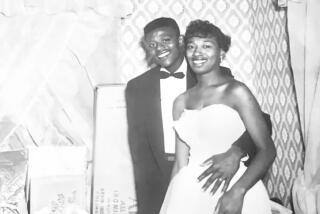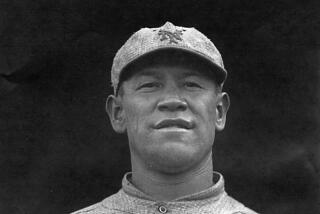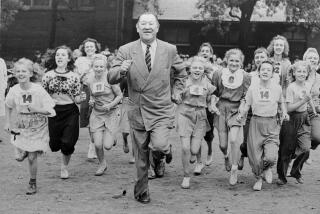An Uneasy Rest : Thorpe’s Tomb Is a Shrine in Pennsylvania, but Some Relatives Want to Take Him Home
- Share via
It took 71 years of asking, but in 1983 the family of Jim Thorpe was finally given back the two Olympic gold medals Thorpe won at the 1912 Stockholm Olympics.
Thorpe, as a Carlisle, Pa., Indian School athlete, played semipro baseball during the summer of 1911, the year before he won his gold medals for the decathlon and pentathlon in Sweden.
Seven months after the 1912 Olympics, a newspaper in Worcester, Mass., reported that Thorpe had earned $2 per game playing baseball.
The International Olympic Committee demanded that Thorpe return the medals, which he did.
Thorpe, who died in 1953, remained bitter for the rest of his life. And so on Jan. 18, 1983, the Thorpe family wept with joy at a Los Angeles hotel when IOC President Juan Antonio Samaranch finally returned the medals.
And now, some members of the family want something else returned: Jim Thorpe’s remains.
The story of how America’s most famous athlete came to be buried in a place his family says he never heard of is almost hard to believe.
Thorpe lies in a 20-ton red granite tomb in Jim Thorpe, Pa., a small mountain town that used to be called Mauch Chunk. As far as anyone knows, Thorpe was never there when he was alive and probably never heard of it.
Nevertheless, its city fathers got Thorpe’s body 39 years ago.
City officials there have denied it for decades, but Thorpe family members maintain that the city obtained the body from Thorpe’s third wife in a commercial transaction, in the hope that Thorpe’s tomb would boost tourism.
Thorpe died of a heart attack on March 28, 1953, in his trailer home at Lomita, Calif. He was 64.
His widow, Patricia Askew Thorpe, had the body shipped to Shawnee, Okla., where his seven children from his first two marriages--he and Patricia had no children--expected he would be buried at a rural family plot.
His body was placed temporarily in a Shawnee mausoleum while a committee was organized to raise money to buy a tomb for Thorpe, who also played major league baseball and pro football during his long athletic career.)
The Oklahoma state legislature appropriated $25,000 for a Jim Thorpe tomb to be built at Shawnee. But in 1954, the measure was vetoed by Oklahoma Gov. William H. Murray.
At that point, Patricia Thorpe--who was to die in 1974--had Thorpe’s body moved to another Shawnee mausoleum. Then she sought to find a suitable resting place for Thorpe--on her terms, according to the Thorpe family.
Carlisle was considered, since he had attended the Indian trade school there from 1904 to 1912 and achieved football fame there.
“Pat just wanted too much money (for the body),” John B. Fowler, a Carlisle civic leader told Sports Illustrated in 1983. Fowler’s committee had even selected a burial site, near the field where Thorpe had played football. “We felt we were getting into a bidding war,” he said.
Next, Patricia Thorpe sought unsuccessfully to involve the NFL in finding a burial site for the man who played in the league for most of the 1920s.
Then Mauch Chunk got into the picture. Located in green mountains about 80 miles north of Philadelphia, the picturesque Lehigh River town had long called itself “The Switzerland of America.”
City fathers in 1954 agreed to build a suitable tomb for Thorpe on a high, grassy park and to change the name of the town from Mauch Chunk to Jim Thorpe. A contract was signed, and the tomb was dedicated in 1957.
Thorpe’s tomb rests on a mound of earth taken from his birthplace, Prague, Okla.; from Carlisle, Pa., where he attended school; from New York’s Polo Grounds, where he played for the New York Giants 1913-1919, and from the Stockholm Olympic Stadium.
The tomb carries an inscription quoting King Gustav V, who during the 1912 medal ceremony said to Thorpe: “Sir, you are the greatest athlete in the world.”
Not shown on the tomb is Thorpe’s response: “Thanks, King.”
Thirty-nine years after his death, many in the Thorpe family remain troubled that Jim Thorpe, a Sac and Fox Indian, was never given a proper Indian burial.
Said his son, Jack Thorpe, 55: “The town of Jim Thorpe has done a good job through the years keeping up the tomb and maintaining the area. We’ve never had a problem with that.
“But we’d all prefer that Dad be buried with the family. In Indian culture, when someone is not buried with his family, the soul wanders, and that troubles me. I’d like to see him buried with his family, but I also realize that he was a public sports figure for all Americans, and I take that into account, too.
“It would be nice to bring him back, and I think that will happen one day. But I’m not as adamant about it as I used to be.
“I travel to Washington, D.C., often, and I’ve driven up there to be with Dad. The burial site has always been well maintained.
“The contract the city signed with Dad’s widow was legally binding. We have asked the city to return the remains to us, but they’ve always refused. We’ve never challenged them in court.”
Grace Thorpe of Yale, Okla., Jim Thorpe’s daughter, said there is no organized family effort to bring her father’s remains to Oklahoma.
“My attitude is, the people of Oklahoma had a chance 40 years ago to have Dad buried here, and they blew it,” she said.
“The people of Jim Thorpe, Pa., acted in good faith. They’ve treated Dad with respect and they have honored him. Over the years, Boy Scouts there have maintained the burial site and planted trees and flowers.”
Jim Thorpe II, a grandson, said he would prefer to see his grandfather buried at the rural family site near Shawnee. He also says Patricia Thorpe sold many of Jim Thorpe’s personal effects.
“We heard she sold off a trunkload of stuff,” he said. “You don’t understand the importance of things like that if you don’t understand Indian culture.”
Another of Thorpe’s daughters, Gail Thorpe, also of Yale, Okla., wants her father’s remains returned to Oklahoma. “I would like to have him back in Oklahoma, but legally I don’t think there’s anything we can do,” she said.
The mayor of Jim Thorpe, Pa., Thomas Wildoner, said his town gave Jim Thorpe a burial site when no one else would.
“We are not going to return the body,” he said. “We do not wish to return it. We gave (Thorpe) a resting place when no one else would. When the Oklahoma governor vetoed a bill to build him a tomb, it meant his own state didn’t want him.
“And Patricia Thorpe did not sell the body to us. We didn’t pay anything. There was no commercial transaction.
“Jack Thorpe himself told me once he was very happy with his father’s grave site, that he may want to retire one day and come here to live.”
Agnes McCartney, who runs the Jim Thorpe, Pa., vacation bureau, said that although Thorpe’s tomb never became the tourist attraction some had hoped, the citizens of Jim Thorpe still cherish America’s famous athlete.
“We treat his resting place as a sacred place,” she said. “There is no junk allowed--no souvenirs or advertising signs anywhere near it.
“The way the contract was drawn up between the city and his widow . . . it’s iron-clad. The body cannot be removed. And we’ve always had a nice relationship with the Thorpe children.”
More to Read
Go beyond the scoreboard
Get the latest on L.A.'s teams in the daily Sports Report newsletter.
You may occasionally receive promotional content from the Los Angeles Times.






